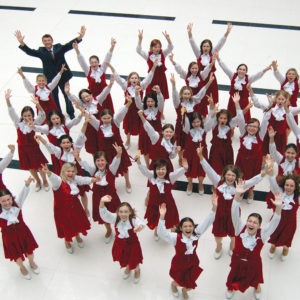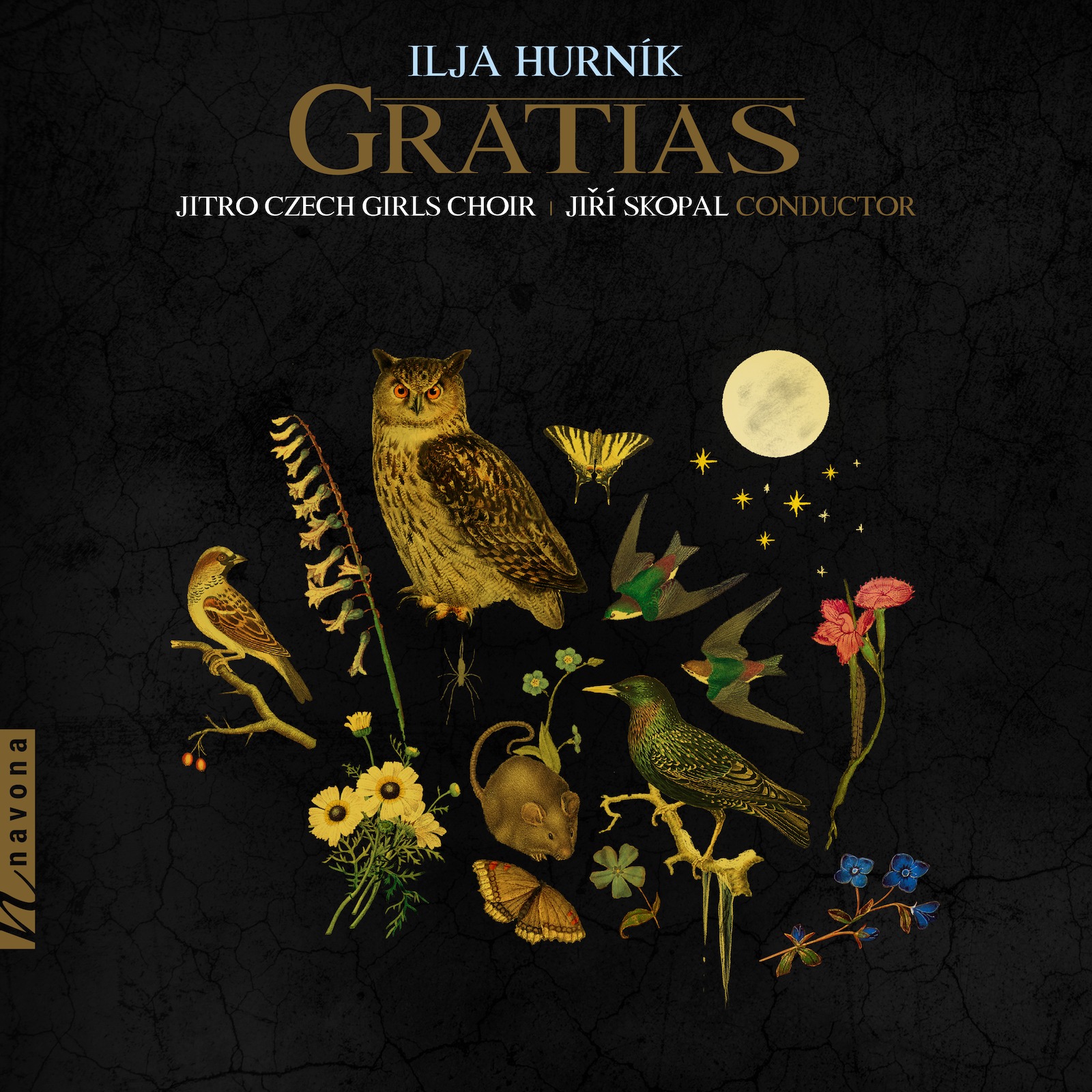Gratias
Ilja Hurník composer
Jitro Czech Girls Choir | Jiří Skopal conductor
The Jitro Czech Girls Choir and conductor Jiří Skopal return with GRATIAS on Navona Records. The commemorative album pays homage to Czech composer Ilja Hurník, whose playful compositions perfectly match the joyful imagination of youth without sacrificing a sliver of musical integrity. Also a prolific author, Hurnik infuses his compositions with narrative texts that give the music a storybook quality.
The Jitro Czech Girls Choir presents this album as a memoriam for Hurnik, who spent decades popularizing classical music and teaching his concise, efficient style to children. His long history with the choir gave him an intimate look into its performance, allowing a symbiosis between composer and performer where each could flourish.
Listen
Stream/Buy
Choose your platform
Track Listing & Credits
| # | Title | Composer | Performer | |
|---|---|---|---|---|
| 01 | Variations on a Mouse Theme: Theme | Ilja Hurník | Jitro Czech Girls Choir | Jiří Skopal, conductor | 0:26 |
| 02 | Variations on a Mouse Theme: Var. 1, Like Bach | Ilja Hurník | Jitro Czech Girls Choir | Jiří Skopal, conductor | 1:15 |
| 03 | Variations on a Mouse Theme: Var. 2, Like Haydn | Ilja Hurník | Jitro Czech Girls Choir | Jiří Skopal, conductor | 0:41 |
| 04 | Variations on a Mouse Theme: Var. 3, As In Romanticism | Ilja Hurník | Jitro Czech Girls Choir | Jiří Skopal, conductor | 2:10 |
| 05 | Variations on a Mouse Theme: Var. 4, Like Today | Ilja Hurník | Jitro Czech Girls Choir | Jiří Skopal, conductor | 1:17 |
| 06 | June Night: I. Nightingale | Ilja Hurník | Jitro Czech Girls Choir | Jiří Skopal, conductor | 2:28 |
| 07 | June Night: II. Little Lights | Ilja Hurník | Jitro Czech Girls Choir | Jiří Skopal, conductor | 1:38 |
| 08 | June Night: III. Stock Owl | Ilja Hurník | Jitro Czech Girls Choir | Jiří Skopal, conductor | 0:40 |
| 09 | June Night: IV. Moon In the Pond | Ilja Hurník | Jitro Czech Girls Choir | Jiří Skopal, conductor | 2:02 |
| 10 | June Night: V. Head Hurts | Ilja Hurník | Jitro Czech Girls Choir | Jiří Skopal, conductor | 1:33 |
| 11 | June Night: VI. Little John | Ilja Hurník | Jitro Czech Girls Choir | Jiří Skopal, conductor | 0:51 |
| 12 | June Night: VII. King David | Ilja Hurník | Jitro Czech Girls Choir | Jiří Skopal, conductor | 2:16 |
| 13 | Children's Tercetta (Arr. for 3 Voices & Piano): I. Icicles | Ilja Hurník | Jitro Czech Girls Choir | Jiří Skopal, conductor | 0:56 |
| 14 | Children's Tercetta (Arr. for 3 Voices & Piano): II. Sparrow and Starling | Ilja Hurník | Jitro Czech Girls Choir | Jiří Skopal, conductor | 0:49 |
| 15 | Children's Tercetta (Arr. for 3 Voices & Piano): III. Swallowtail | Ilja Hurník | Jitro Czech Girls Choir | Jiří Skopal, conductor | 1:42 |
| 16 | Children's Tercetta (Arr. for 3 Voices & Piano): IV. Foal | Ilja Hurník | Jitro Czech Girls Choir | Jiří Skopal, conductor | 0:53 |
| 17 | Children's Tercetta (Arr. for 3 Voices & Piano): V. Butterfly | Ilja Hurník | Jitro Czech Girls Choir | Jiří Skopal, conductor | 1:43 |
| 18 | Children's Tercetta (Arr. for 3 Voices & Piano): VI. In the Rain | Ilja Hurník | Jitro Czech Girls Choir | Jiří Skopal, conductor | 1:29 |
| 19 | Children's Tercetta (Arr. for 3 Voices & Piano): VII. Owl | Ilja Hurník | Jitro Czech Girls Choir | Jiří Skopal, conductor | 1:24 |
| 20 | Children's Tercetta (Arr. for 3 Voices & Piano): VIII. Little Spider | Ilja Hurník | Jitro Czech Girls Choir | Jiří Skopal, conductor | 1:48 |
| 21 | Water, Sweetwater: I. Rain | Ilja Hurník | Jitro Czech Girls Choir | Jiří Skopal, conductor | 1:49 |
| 22 | Water, Sweetwater: II. Well | Ilja Hurník | Jitro Czech Girls Choir | Jiří Skopal, conductor | 3:01 |
| 23 | Water, Sweetwater: III. The Eternal Pilgrimage | Ilja Hurník | Jitro Czech Girls Choir | Jiří Skopal, conductor | 2:22 |
| 24 | Missa Vinea Crucis (Version for Female Choir & Organ): I. Kyrie | Ilja Hurník | Jitro Czech Girls Choir | Jiří Skopal, conductor | 2:42 |
| 25 | Missa Vinea Crucis (Version for Female Choir & Organ): II. Gloria | Ilja Hurník | Jitro Czech Girls Choir | Jiří Skopal, conductor | 3:31 |
| 26 | Missa Vinea Crucis (Version for Female Choir & Organ): III. Credo | Ilja Hurník | Jitro Czech Girls Choir | Jiří Skopal, conductor | 5:34 |
| 27 | Missa Vinea Crucis (Version for Female Choir & Organ): IV. Sanctus - Benedictus | Ilja Hurník | Jitro Czech Girls Choir | Jiří Skopal, conductor | 2:16 |
| 28 | Missa Vinea Crucis (Version for Female Choir & Organ): V. Agnus Dei | Ilja Hurník | Jitro Czech Girls Choir | Jiří Skopal, conductor | 3:31 |
| 29 | Missa Vinea Crucis (Version for Female Choir & Organ): VI. Deo Gratias | Ilja Hurník | Jitro Czech Girls Choir | Jiří Skopal, conductor | 2:00 |
SOLOISTS
Michaela Urbanová (13-20)
Irena Mázlová (13-16, 18-20)
Pavla Frýdová (13-17, 19,20)
Anna Schreiberová (9,10,12,17,18)
Kateřina Růžičková (7)
Mirka Balcarová (9)
Martina Jelínková (22)
Daniela Čížková (24)
Kateřina Dolečková (24)
Barbora Hübnerová (25,26)
PIANO Michal Chrobák
ORGAN František Vaníček
Tracks 1-5 recorded March 3, 2008 at Philharmony Hall in Hradec Králové, Czech Republic.
Tracks 6-12 recorded October 12, 2008 at Philharmony Hall in Hradec Králové, Czech Republic.
Tracks 13-20 recorded October 11, 2008 at New Adalbertinum Hall in Hradec Králové, Czech Republic.
Tracks 21-23 recorded April 18, 1999 at Beseda Hall in Chrudim, Czech Republic.
Recording Session Engineer Václav Vlachý
Recording Session Producer Jan Kyselák
Tracks 24-29 recorded June 10, 1996 in the Church of The Exaltation of the Holy Cross in Uničov, Czech Republic.
Recording Session Engineer Otakar Tajovský
Recording Session Producer Petr Řezníček
General Manager of Audio & Sessions Jan Košulič
Audio Director Lucas Paquette
Executive Producer Bob Lord
Executive A&R Sam Renshaw
A&R Director Brandon MacNeil
VP, Design & Marketing Brett Picknell
Art Director Ryan Harrison
Design Edward A. Fleming
Publicity Patrick Niland, Sara Warner
Artist Information

Jitro
Jitro, meaning “Daybreak” in Czech, is more than just a concert choir from Hradec Kralove, Czech Republic. It is an organization of 400 children in seven preparatory ensembles, of which only the best 25 or 30 qualify to tour. For the past 45 years they have been admired all over the world for their tonal brilliance, superb intonation, distinctively rich blend of sound, and energetic vitality. Today, Jitro is considered one of the best children’s choirs in the world.

Jiří Skopal
Jiří Skopal, choral conductor and music educator, was born on August 15, 1947 in Velké Losiny, Czech Republic. Skopal received his first music education from his father, Jan Skopal, a choral conductor of North Moravia’s Teachers’ Association. For his Master’s in Education, he studied in Olomouc from 1965 to 1969, and received his doctorate in 1973. In 1982, he was named Associate Professor at the Charles University in Prague, and in 1994 he became a full Professor.

Ilja Hurník
The life and work of Ilja Hurník (November 25, 1922–September 7, 2013) is a story about gifts and thanks. He described his own life story as a cultivation of those gifts: “I was given four rails: firstly the pianist’s, secondly the composer’s, thirdly the writer’s, and finally, the teacher’s.” These rails all led from the small Silesian village of Poruba, today a suburb of Ostrava in northern Moravia. He distributed these gifts starting at the age of 6 in a recitation and theatre ensemble and in his first compositions, aided by his studies of German grammar, piano, and music composition. Before the occupation of the Sudetenland in 1938, his family fled to Prague, and Hurník brought with him the cultural, literary, and musical idioms from his home. He continued his studies of piano with Vilém Kurtz and composition Vítězslav Novák at the conservatory, went on to study at the Academy of Performing Arts, and began a 20-year career as a soloist with the Janáček Philharmonic Orchestra in Ostrava, focusing on the piano works of Debussy and Janáček. At the same time, he became famous as a music educator and popularizer of classical music, commenting on concerts for school children and creating a magnificent gramophone edition of The Art of Listening to Music (1972).
Notes
“Duets for children’s choir with piano accompaniment Ilja Hurník’s June Night caught Jitro as a sensitive performer of music by a familiar composer. Love folk lyrics (and a rhyme in the case of Vejr) are strung like contrasting beads into a seven-part cycle with a great opportunity for expressive contrast, full sound and remarkable solo parts. A total of five soloists, members of the choir, complemented the interpretive breadth and interest with new sound valeries, especially in The Moon in the Pond (no text), where the choir’s brumendo with two open vocals strongly evoked the enchantment of moonlight on the water surface.”
— Stanislav Bohadlo. Hradec Králové Children’s Choir Jitro at the Prague Spring, Harmonie plus, 9.05.2014
“You are absolutely amazing and your gifts went to my heart, warmed my soul and made my life better. Maestro, you are extraordinary and I am honored to know you! Singers, I am your biggest fan! Thank you!”
— Andrew Eisenmann
“A hugely enjoyable performance and great choice of repertoire! Your level of focus, rhythmic precision and intensity throughout your program was excellent. I love that you are staging this kind of repertoire, it is so different from what we often hear from children’s choir… Well, an incredible performance.”
— Dan Walker
Australian International Music Festival. The Sydney Opera House 7/5/2018, Choral Adjudication Sheets
“The choir prove their musicianship over a much longer time frame, as part of a broader ensemble. The first and best-loved panel of Songs from the Czech Highlands (1955-59, four settings of folk-inspired poems by Miroslav Bureš), The Opening of the Wells is just a joy to listen to, a wonderful synthesis of the simplicity of folk song with a larger, semi-dramatic canvas. I spent two days listening to this wonderful disc and the broadest of smiles never left my face.”
— Guy Rickards, Review MARTINŮ Openings. GRAMOPHONE 07/2020 www.gramophone.co.uk

